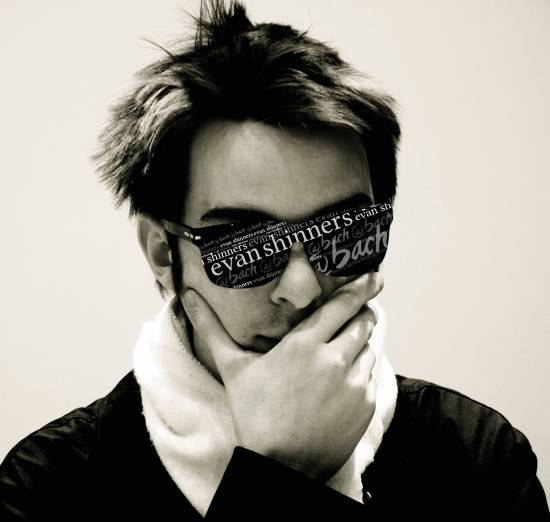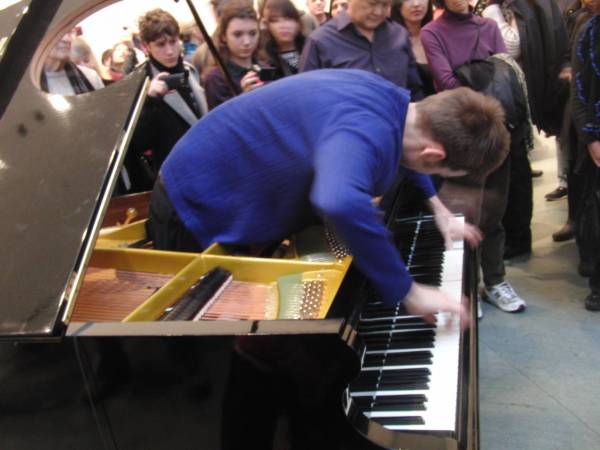
Evan Shinners will give an all-Bach solo upright piano recital at Barbès on May 10, then play twi-ny’s tenth anniversary party at Fontana’s on May 18 with a full band
Tuesday, May 10, Barbès, 376 Ninth St. at Sixth Ave., Brooklyn, strongly suggested donation $10, 347-422-0248, 7:00
Wednesday, May 18, Fontana’s, 105 Eldridge St. between Grand & Broome Sts., free, 212-334-6740, 7:00
www.evanshinners.com
Juilliard graduate Evan Shinners has been playing the piano since he was nine and made his orchestral debut when he was a mere twelve years old, with the Utah Symphony. But the Bach-loving New Yorker is not your average classical musician. In addition to having appeared at Carnegie Hall, Avery Fisher Hall, the Museum of Modern Art, and other prestigious venues around the world, he leads a band that pounds away at aggressive pop music in smaller clubs. Shinners, who sees a melding of styles as the future of classical music, will be at Barbès in Park Slope on Tuesday night as part of the Upright Piano Brigade series being presented by the Concert Artist Guild, a Tuesday–night residency through July in which musicians will perform solo classical works on upright piano. Shinners will be playing an all-Bach program that includes Toccatas in E and D, a “wild” prelude and fugue in A, an early version of the triple concerto, a partita, and a few smaller rarities. Then, on May 18, Shinners and his band will be the closing act at twi-ny’s tenth anniversary party at Fontana’s on the Lower East Side.
twi-ny: You recently played Beethoven at MoMA in a mobile, cut-out piano followed by onlookers who were snapping photos in your face as you all moved around the space together. What was that experience like?
Evan Shinners: One of my goals is to bring classical music to people in a setting where they would not normally hear it. If someone hears Beethoven’s Ninth from that piano all hollowed out in an art museum and they appreciate it, it only proves the universality of the great classical composers and speaks volumes about how classical music can reach the masses anywhere outside the concert halls.
twi-ny: What are a bunch of Juilliard graduates doing playing punk rock?
Evan Shinners: Well, I wouldn’t call the band punk by any means, and I have my own theories about what classical music of 2011 is and what it isn’t. If I had to briefly touch on that, we play what is closer to classical than what classical pretends to be today. I could argue that for a while. . . . Essentially, it is important to know that most of the band did not get their first music lessons in classical or jazz. In fact, three out of five of them started learning rock/pop songs first before taking up their Juilliard “callings.” I am lucky that the members can play all styles, and I wouldn’t have it any other way as we often jump from Bach to rock within one piece.

Evan Shinners was one of six pianists who performed Allora & Calzadilla’s moving “Stop, Repair, Prepare: Variations on Ode to Joy for a Prepared Piano” in the MoMA atrium (photo by twi-ny/mdr)
twi-ny: Your upcoming album, @bach, which will be released later this month, is a collection of live Bach works performed on keyboard. What is it that draws you to Bach? What about other favorites?
Evan Shinners: The universality of Bach is it. No other music is so adaptable. Rappers rap over him, saxophones blow over him, I lift chord progressions directly from his cantatas and make rock songs based on him — his music is perfectly timeless. With Bach I can take up all my influences, from [Thelonius] Monk to Eminem, and have them come out in the same piece of Bach’s. . . . Try doing that with Schumann (no disrespect to ol’ Robert, though).
twi-ny: What is on your iPod these days?
Evan Shinners: On the iPod it is either [harpsichordist] Wanda Landowska or rap.
twi-ny: Do you get different types of satisfaction when playing classical music as opposed to when you play pop and rock? How do the very different kinds of audiences, and their energy levels, affect or influence your playing?
Evan Shinners: I love the rock audiences. I love getting yelled at, taunted, rushed, et cetera. I’m also tired of musicians complaining about noisy audiences — try being Bob Dylan (or anyone else who dealt with it) and get booed everywhere you go and still play your heart out; I have respect for those musicians who can. A goal of mine: all Bach in Carnegie Hall where everyone sits down with red wine in paper cups, claps between the pieces (gasp!), yells, taunts, boos, screams, riots, mosh pits in the aisles. . . . You want the classical audiences to start growing? Try that atmosphere for starters; Paganini’s crowds used to be a lot more rowdy than the crowds of today.